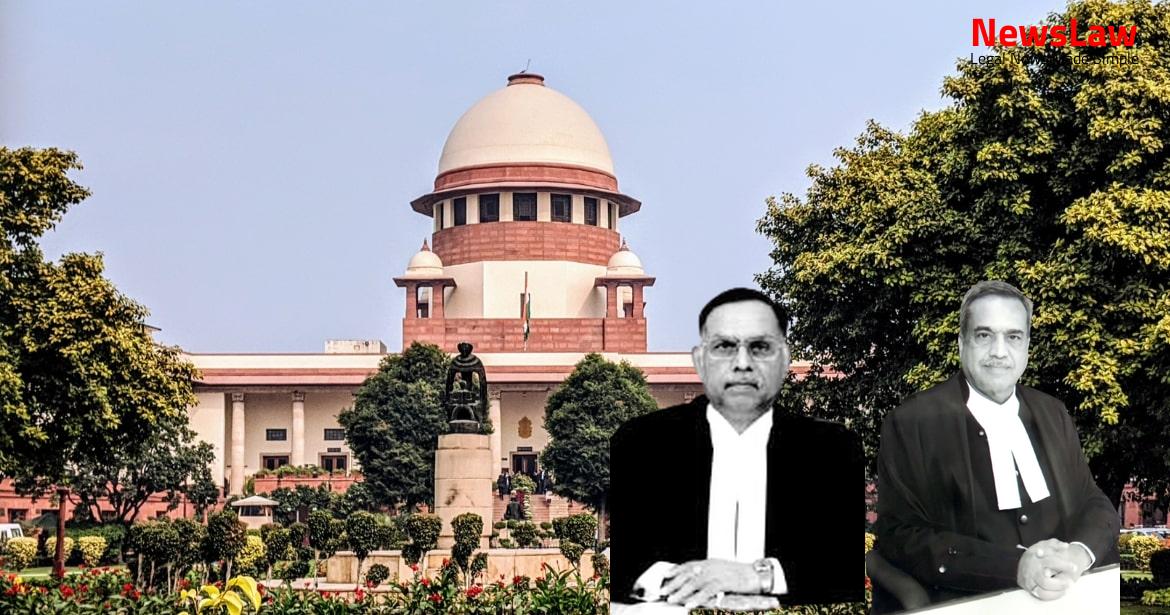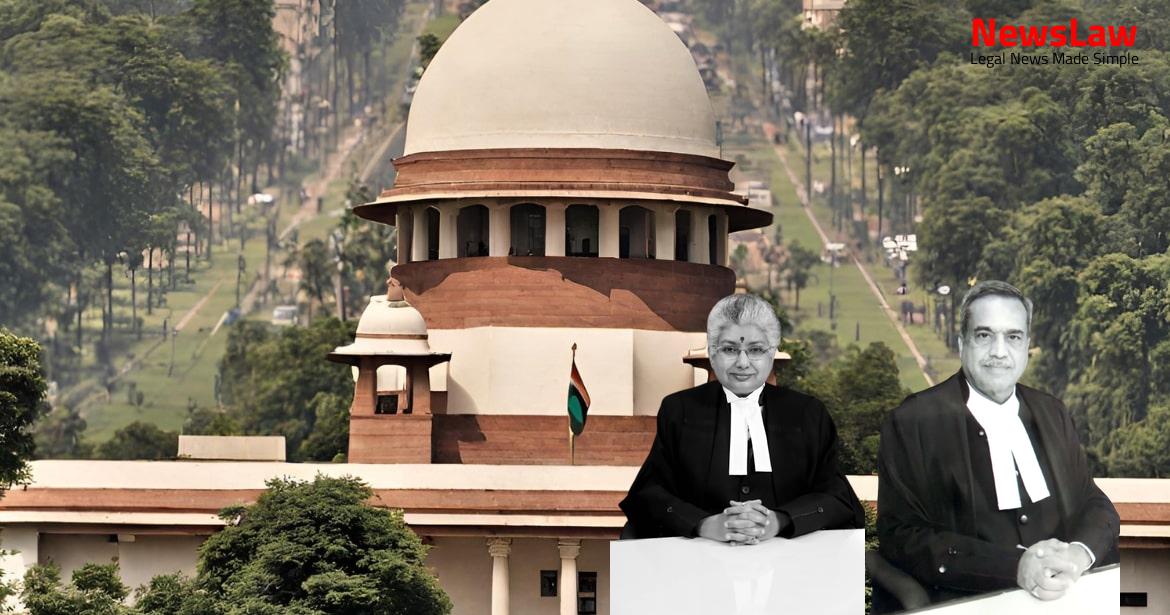The court’s detailed legal analysis in a recent case explores the interpretation of ‘proceedings’ within the realm of insolvency law. Unraveling the complexities of Section 14 of the Insolvency and Bankruptcy Code, the court’s insights provide clarity on the inclusion and exclusion of criminal proceedings like Section 138. Stay tuned to understand how the court’s interpretation shapes the boundaries of legal proceedings during insolvency resolutions.
Facts
- An appeal was filed before the Court on 26.10.2018, which ordered a stay of further proceedings in two complaints before the ACMM.
- The NCLAT set aside the Court’s order, stating that Section 138 is a criminal law provision and not a ‘proceeding’ under Section 14 of the IBC.
- A resolution plan submitted by the company’s promoters was approved by the creditors, leading to the end of the moratorium on 30.09.2019.
- A withdrawal application for the resolution plan approval has been filed by financial creditors before the Adjudicating Authority.
- Statutory demand notices were issued on 31.03.2017 under Section 138 and 141 of the Negotiable Instruments Act, demanding payment within 15 days.
- Criminal complaints were filed under Section 138 against the company and its directors for non-payment.
- 51 cheques issued by the company were dishonoured for insufficient funds, leading to insolvency proceedings under the IBC.
- The Adjudicating Authority stayed proceedings in the criminal complaints on 24.05.2018.
- A second demand notice was issued on 05.05.2017 for payment within 15 days.
- Cheques presented were returned dishonoured for ‘funds insufficient’ on 28.04.2017.
Also Read: Limitation Period in Arbitration Disputes: Court’s Legal Analysis
Issue
- The important question in this appeal is whether the proceeding under Section 138/141 of the Negotiable Instruments Act is covered by the moratorium provision of Section 14 of the IBC.
- Both applications are pending before the Adjudicating Authority as of now.
- Next date of hearing before the Authority is 08.02.2021.
Also Read: Interpretation of Royalty in Software Import Case
Arguments
- The argument made by Shri Jayanth Muth Raj, learned Senior Advocate for the appellants, is that Section 14 of the Insolvency and Bankruptcy Code (IBC) aims to preserve the assets of the corporate debtor during the insolvency resolution process.
- He pointed out that Section 138 proceedings, although criminal, primarily focus on recovering the amount of the bounced cheque, which should not be exempt from the moratorium imposed by Section 14(1)(a) of the IBC for corporate debtors.
- He referenced the Insolvency Law Committee’s report and emphasized that criminal proceedings like Section 138 should not fall under the scope of Section 14 as it would defeat the purpose of the provision.
- The argument also highlighted the significance of the ‘as well as’ terminology in the section and drew comparisons with moratorium provisions for individuals and firms under the IBC to support the exclusion of Section 138 proceedings for corporate debtors.
- Additionally, he overruled previous judgments suggesting the opposite view and relied on the rules of construction like ejusdem generis/noscitur a sociis to strengthen his stance on the interpretation of ‘proceedings’.
- The argument was further supported by citing specific cases and judgments that demonstrate the distinction between civil and criminal proceedings and the high court’s historical interpretation of applying. Section 14 of the IBC.
- He concluded that the broad language used in Section 14(1)(a) should encompass all proceedings, civil or criminal, that can result in coercive actions against the corporate debtor’s assets.
- Shri Aman Lekhi argues that criminal prosecutions are distinct from the expression ‘proceedings’ in Section 14(1)(a) of the IBC.
- He emphasizes that the offence under Section 138 is a purely criminal offense resulting in jail sentences or fines, exclusively under the IPC.
- A subordinate criminal court cannot terminate Section 138/141 proceedings upon payment of compensation as per criminal law.
- The rule of noscitur a sociis is applied to interpret ‘proceedings’ in Section 14(1)(a) of the IBC, indicating civil proceedings dealing with private rights of action.
- The introduction of Section 32A in the IBC supports the exclusion of criminal proceedings from Section 14’s scope.
- The construction of ‘proceedings’ in Section 14 to include criminal proceedings would render certain provisions of the IBC redundant.
- The judgment in Aneeta Hada case is cited as authority.
- Different counsels present varying arguments regarding the application of noscitur a sociis in interpreting defamation in the context of freedom of speech under Article 19(1)(a).
- The duty of the court is highlighted to uphold the spirit and values of the Constitution in interpreting Article 19(2).
- The principle of noscitur a sociis can be utilized in interpreting the Constitution, considering the broader context and values.
- Sections 81 and 101 of the IBC are referenced to argue that the moratorium under the IBC only applies to civil proceedings related to debt recovery, not criminal proceedings like those under Section 138.
Also Read: Interpretation of Section 43B: Debentures vs. Interest Payment
Analysis
- Section 147 of the Negotiable Instruments Act, 1881 allows for the compounding of offenses prescribed under the same Act.
- Section 32A of the Insolvency and Bankruptcy Code, 2016 clarifies that certain licenses or permits given by authorities shall not be suspended or terminated due to insolvency, provided current dues are paid during the moratorium period.
- The moratorium provision under Section 14 of the IBC prohibits legal actions against the corporate debtor, asset transfers, enforcement of security interests, and property recovery by owners or lessors.
- The rationale behind enacting Section 32A was explained in the Report of the Insolvency Law Committee of February 2020.
- Sections 143A and 148 of the Negotiable Instruments Act allow for the court to direct interim compensation and payment pending appeal against conviction for dishonored cheques.
- Specific procedures outlined in various sections of the Acts guide the resolution of insolvency, composition of offenses, and contempt of court issues.
- The High Court has jurisdiction to inquire into or try a contempt of itself or any subordinate court, irrespective of the location of the alleged contempt.
- The obligations of directors and officers in cases of contempt of court, insolvency, and moratorium periods are clearly defined in the legal provisions.
- Key definitions and exceptions pertaining to insolvency, fresh start orders, and resolution professionals’ roles are outlined to maintain clarity and efficacy in legal processes.
- The ratio of C.V. Parekh [(1970) 3 SCC 491 : 1971 SCC (Cri) 97] is relied upon
- The judgment was given by a three-Judge Bench
- The specific ratio laid down in the case is crucial to the argument being made
- Section 138/141 proceedings will continue against the company and the appellants due to reasons stated in the judgment and the fact that insolvency resolution process does not involve new management taking over.
- The moratorium period in this case has ended.
- Complaint filed against the corporate debtor alone without joining any persons responsible for the business conduct needs to be quashed based on the judgment in Civil Appeal No.10355 of 2018.
Decision
- Moratorium provision under IBC does not extend to persons other than the corporate debtor.
- Judgment in Civil Appeal No.10355 of 2018 holds that the moratorium order does not cover individuals like Directors who are not corporate debtors.
- Petitions under Section 9 of the IBC were admitted against corporate debtors, leading to the imposition of moratorium.
- Section 14 of the IBC does not apply to quash Section 138 proceedings against erstwhile Directors/persons in charge of the corporate debtor.
- Judgment in Civil Appeal No.10355 of 2018 mandates that proceedings can continue against former Directors/persons responsible for the business of the corporate debtor.
- Adjudicating Authority admitted petitions under Section 9 of the IBC against the corporate debtors and imposed moratoriums in various cases.
- In a specific case, a petition under Section 7 of the IBC was admitted, leading to the imposition of moratorium and rejection of a petition under Section 482 of the CrPC.
- Impugned judgments were set aside based on the judgment in Civil Appeal No.10355 of 2018, directing the continuation of complaints against appellants or individuals responsible for the business of the corporate debtor.
- Remand of cases to the Magistrate to apply the law laid down in Civil Appeal No.10355 of 2018 and decide other points accordingly.
- Specific complaints under Section 138 of the Negotiable Instruments Act were filed against the corporate debtor and individuals responsible for the business conduct.
Case Title: P. MOHANRAJ Vs. M/S. SHAH BROTHERS ISPAT PVT. LTD. (2021 INSC 133)
Case Number: C.A. No.-010355 / 2018



